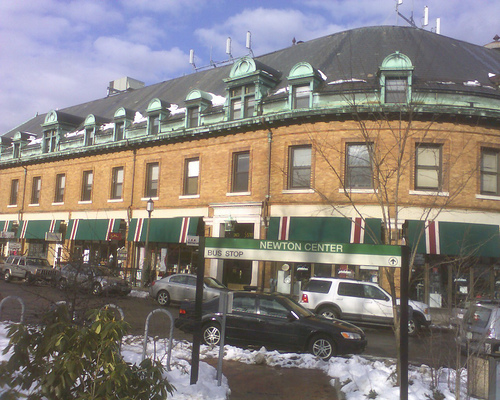We, the sustainable consumption folks, like to talk about density and walkable and bikeable communities as important elements of a shift toward sustainable consumption. But very few of us actually try to implement these ideas. In the past year I have tried, and I can report that this was a hard-won victory, and a sobering lesson.
I live in Newton, with a population of 85,000 inhabitants, one of the most desirable communities in Massachusetts, USA. It is an old city of beautiful single family homes, plenty of parks and recreation areas, majestic trees, lakes and Charles River, fine schools, abundant public services, and one of the lowest crime rates in the country. It also has convenient public transit to downtown Boston, which is only a few miles away. Newton is a collection of 11 “villages”, the centers of which usually have nice cafes, restaurants, shops, and nail salons. Not surprisingly, the price of homes in Newton has been rising steadily over the years. Currently, the average price of an existing home is $0.8 million and of a new home $1.6 million. Newton used to be a place where moderately successful middle class professional could raise a family. This is no longer the case; we have become a city of rich people and aging baby boomers who are trying to hold on to their oversized and impractical homes because there are no alternative housing options in this city.

The mayor is pushing for introducing more housing that is affordable for the middle class. He is leading an effort to develop a long-term strategy aimed at reversing or at least slowing down the trend of increasing prices and growing cultural homogeneity and social exclusion. That means more multifamily housing and greater density. As a test case, the city proposed to turn a large publicly-owned parking lot in one of the village centers into a four-story apartment building with 68 middle-priced and subsidized low income units, and commercial spaces on the ground level. A local developer proposed a nice package deal that would include creating a public plaza, upgrading of the village center, promoting walkable lifestyles, and at the same time preserving most of the sacrosanct parking spaces that the current lot provides.
Being a local sustainability activist (I am a vice chair of Citizens’ Energy Commission) I enthusiastically endorsed the project as consistent with the current wisdom regarding building more sustainable communities. To me it seemed like a no-brainer. This particular village center already has 2-3 story commercial (but not residential) buildings, it has a supermarket, shops and business within walking distance, and a Boston-bound commuter train station. The building would add economic activity and transform the decrepit looking parking lot into a thriving community. It would be a winner from a sustainability perspective. And what is the big deal: it is just one building in a city of 85,000 residents!
How naïve I was thinking that a good sustainability project would be embraced in my progressive, left-leaning, environmentally and politically correct city of Newton!
The project became a flashpoint for the most contentious political fight in the history of Newton. For over a year the proponents and opponents of the project passionately fought each other in various public fora and behind the scenes. Petitions, newspaper articles, strategy sessions abounded. This was a clash of worldviews on wealth, inequality, economic justice, and equal opportunities. Some of the leading opponents to the project included vocal environmental activists and political liberals. Behind the official set of objections ― increased traffic, overburdening of local schools that follows greater density, and altering the architectural character of the city ― were the less attractive motives, including bigotry and elitism. Once I heard a privately whispered comments about “importing the poor” into our community and their children burdening the schools. Mind you, we are talking about expected monthly rent being in the $2000-plus range. Two days ago the aldermen voted on the project in front of a capacity pushing audience of citizens. It was close to midnight when the final single vote assured the approval of the project. We all walked away exhausted.
So this is the profound lesson from the Newton experience. If we want to pursue policies that promote more sustainable lifestyles and consumption patterns, we have to be prepared to confront the fundamental worldviews people hold. This will be a confrontation of values, fears, aspirations and prejudices. Your very nice neighbors with liberal voting record and a composting system and chicken coups in their backyard may become the opposition leaders, and your quirky grumpy neighbors with a pesticide-fed lawn may support such projects. The fight will proceed town by town and project by project, and it will not be easy.

